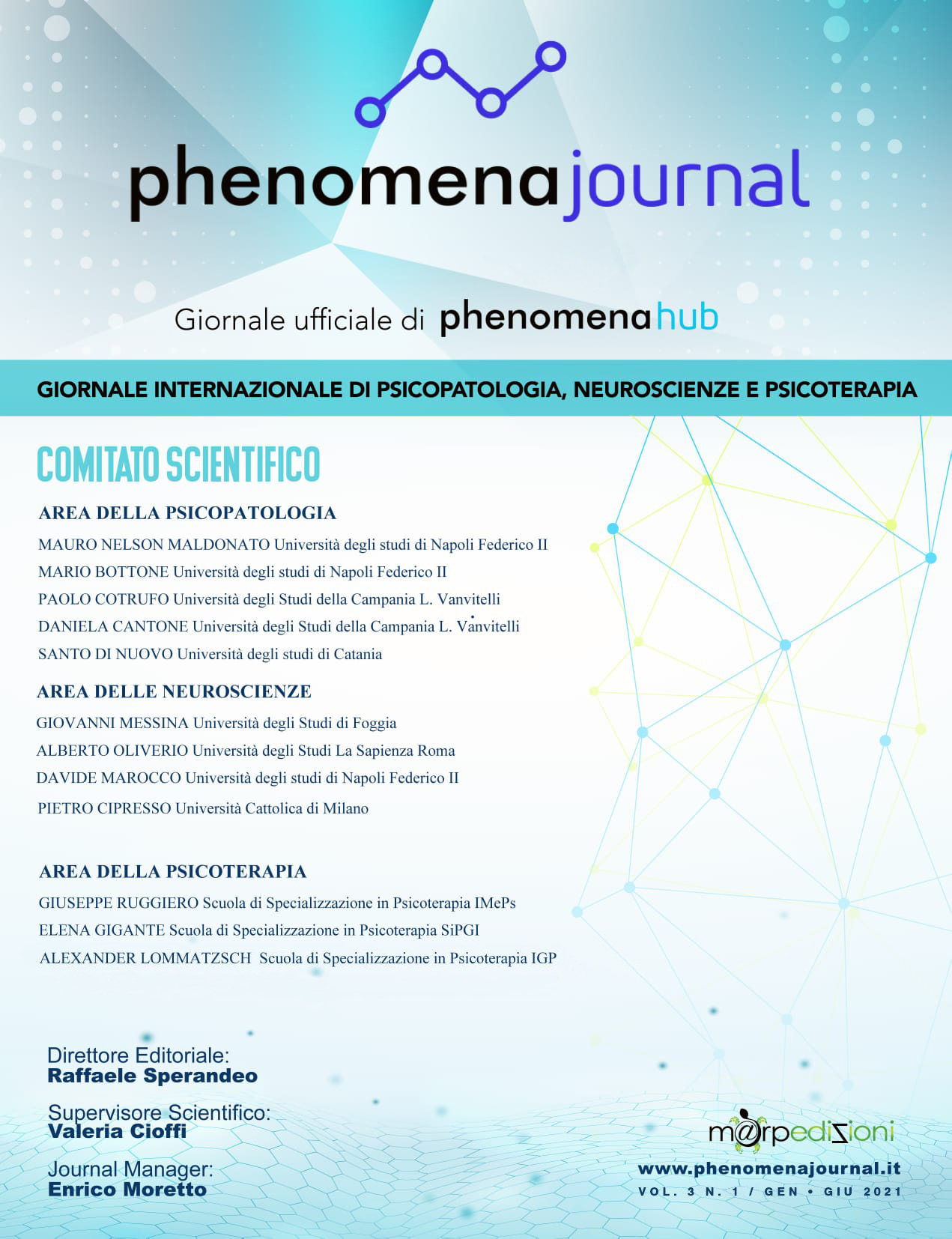Pubblicato 28.05.2021
Parole chiave
- Gestalt, Sport, Body, Integration
Come citare
Abstract
The baggage inherited from our western culture is characterized by the artificial division between those which are the elements of a single reality: the mind and the body. This split is also expressed through our language; we do not have a single word that allows us to say "I-body" but we refer to it by saying my body, as if it were an object we possess, not a part of the self. We often think we have a body, understood as something different from us, in reality we are the body and it is our own life. Gestalt therapy, as holistic body and emotional mediation therapy, considers the mind and body as inseparable aspects, seeks the unity of the person and considers the organism as a whole. Talking about a holistic model in sports psychology makes us understand how the concepts of body and mind no longer help us to describe the functioning of the human being / athlete in a performance. Sports psychology, as well as gestalt psychotherapy, is characterized by a global and / or functional theory of the individual: no longer pyramidal, with a mind that controls everything from above, but circular, in which all various psycho / bodily plans contribute equally to the complex organization of the organism, and therefore to performance. The work has a twofold objective: the integration of sport into the integrated Gestalt model and the creation of a new intervention model in sports psychology with the help of the integrated Gestalt model.
Keywords: Gestalt, Sport, Body, Integration
Abstract in italiano
Il bagaglio ereditato dalla nostra cultura occidentale è contraddistinto dalla scissione artificiosa tra quelli che sono gli elementi di un'unica realtà: La mente ed il corpo. Tale scissione si esprime anche mediante il nostro linguaggio; infatti non abbiamo un'unica parola che ci permette di dire “io-corpo” ma ci riferiamo ad esso dicendo il mio corpo, come se fosse un oggetto che possediamo, non una parte del sé. Spesso pensiamo di avere un corpo, inteso come qualcosa di diverso da noi, in realtà noi siamo il corpo ed esso è la nostra stessa vita. La psicoterapia della gestalt, in quanto terapia olistica a mediazione corporea ed emozionale, considera la mente ed il corpo come aspetti inscindibili, ricerca l’unità della persona e considera l’organismo nella sua totalità. Parlare di un modello olistico nella psicologia dello sport fa comprendere come i concetti di corpo e mente non ci aiutano più a descrivere il funzionamento dell’essere umano/atleta in una performance. La Psicologia dello sport, così come la psicoterapia della gestalt si caratterizza per una teoria globale e/o funzionale dell’individuo: non più di tipo piramidale, con una mente che controlla tutto dall’alto, ma di tipo circolare, in cui tutti i vari piani psico/corporei contribuiscono in modo paritario alla complessa organizzazione dell’organismo, quindi della performance. Il lavoro si pone un duplice obiettivo: l’ integrazione della pratica sportiva nel modello gestaltico integrato e la creazione di un nuovo modello d’intervento in psicologia dello sport con l’ausilio del modello gestaltico integrato.
Password: Gestalt, Sport, Corpo, Integrazione
Riferimenti bibliografici
- World Health Organization. (2007). A guide for population-based approaches to increasing levels of physical activity: implementation of the WHO global strategy on diet, physical activity and health.
- Karteroliotis, K., Psychountaki, M., Stavrou, N., & Skordilis, E. (2018). Sviluppo di modelli di riferimento per programmi di attività fisica, sport ed eventi sportivi. in Corpore Sano, 42.
- World Health Organization. (2019). Global action plan on physical activity 2018-2030: more active people for a healthier world. World Health Organization.
- Menditto, M. Rametta F. (2003) L’identità e le sue forme: sviluppi ed innovazioni dalla Gestalt originaria alla Gestalt Psicosociale. SIG, Roma
- Giusti, E. Azzi, L. (2013) Neuroscienze per la Psicoterapia: La Clinica dell’Integrazione Trasformativa. Sovera Edizioni.
- Lucidi, F. (2012). SportivaMente: temi di psicologia dello sport. SportivaMente, 1-474.
- Simone, M. (2012). Modello O.R.A.: Obiettivi, Risorse, Autoefficcia nella Vita e nello Sport, Utilizzando Gestalt, EMDR e Ipnosi. Conference Paper Congresso F.I.A.P. “La psicoterapia nel villaggio globale”.
- Raffuzzi, L., Inostroza, N., & Casadei, B. (2006). Per uno sport che aiuta a crescere, “L’Approccio Centrato sull’Atleta”. ACP–Rivista di Studi Rogersiani.
- Rossi, O. (1998). L’utilizzazione clinica dell’attenzione e della consapevolezza nella psicoterapia della gestalt. Formazione in Psicologia, Psichiatria, Psicoterapia, 32-33.
- Clarkson, P. (2019). Gestal Counseling: Per una consulenza psicologica proattiva nella relazione d'aiuto. Sovera Edizioni.
- Francesetti, G., Ammirata, M., Riccamboni, S., Sgadari N.,Spagnuolo Lobb, M. (2014). Il dolore e la Bellezza. Atti del III Convegno della Società Italiana Psicoterapia Gestalt. Franco Angeli, Milano.
- do Espírito Santo, A. A. (2017). Em busca de uma boa forma de fazer psicologia do esporte: contribuições da gestalt-terapia. Revista da Abordagem Gestáltica: Phenomenological Studies, 23(1), 45-54.
- Clarkson, P. (2019). Gestal Counseling: Per una consulenza psicologica proattiva nella relazione d'aiuto. Sovera Edizioni.
- Giges, B., Petitpas, A. J., & Vernacchia, R. A. (2004). Helping coaches meet their own needs: Challenges for the sport psychology consultant. The Sport Psychologist, 18 (4), 430-444.
- Benedetti, C. (2012, 11 febbraio). Il processo Terapeutico come allenamento della mente. http://www.carlobenedettimichelangeli.it/gestaltico/la_psicoterapia__palestra_per_gli_le_allena_MENTI.html

